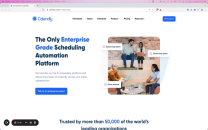
Calendly
Founded Year
2013Stage
Series B | AliveTotal Raised
$350.55MValuation
$0000Last Raised
$350M | 4 yrs agoRevenue
$0000Mosaic Score The Mosaic Score is an algorithm that measures the overall financial health and market potential of private companies.
-51 points in the past 30 days
About Calendly
Calendly operates as a scheduling automation platform that focuses on streamlining the meeting lifecycle for individuals, teams, and organizations. The company offers a solution that automates the process of scheduling meetings, eliminating the need for back-and-forth emails to find suitable times, and integrates with calendars to reflect real-time availability. Calendly primarily serves sectors such as sales, marketing, customer success, recruiting, information technology (IT), and education. It was founded in 2013 and is based in Atlanta, Georgia.
Loading...
Calendly's Product Videos


ESPs containing Calendly
The ESP matrix leverages data and analyst insight to identify and rank leading companies in a given technology landscape.
The calendar management technology market provides tools and technologies to manage schedules, appointments, and meetings. Calendar management technologies include digital calendars, scheduling software, and meeting management systems. The market has seen significant growth in recent years, driven by the increasing adoption of remote work and the need for efficient and flexible scheduling solution…
Calendly named as Leader among 8 other companies, including Booxi, Phorest, and Cal.com.
Calendly's Products & Differentiators
Calendly
Calendly is the easiest way for teams to schedule, prepare, and follow-up on external meetings.
Loading...
Expert Collections containing Calendly
Expert Collections are analyst-curated lists that highlight the companies you need to know in the most important technology spaces.
Calendly is included in 4 Expert Collections, including Unicorns- Billion Dollar Startups.
Unicorns- Billion Dollar Startups
1,244 items
Wealth Tech
2,294 items
Companies and startups in this collection digitize & streamline the delivery of wealth management. Included: Startups that offer technology-enabled tools for active and passive wealth management for retail investors and advisors.
Work From Home Startups
91 items
Track startups and capture company information and workflow.
Fintech
9,294 items
Companies and startups in this collection provide technology to streamline, improve, and transform financial services, products, and operations for individuals and businesses.
Latest Calendly News
Sep 3, 2024
To embed, copy and paste the code into your website or blog: <iframe frameborder="1" height="620" scrolling="auto" src="//www.jdsupra.com/post/contentViewerEmbed.aspx?fid=61ddbdaf-8b9e-47d2-8ad5-4a8572f37d22" style="border: 2px solid #ccc; overflow-x:hidden !important; overflow:hidden;" width="100%"></iframe> The shift to virtual and hybrid networking has brought both opportunities and challenges for business lawyers. While virtual connections can broaden your reach, they also come with unique difficulties, such as screen fatigue and the lack of personal touch. Here’s how you can overcome the common negatives of modern networking to make meaningful connections: Combat Screen Fatigue with Intentional Engagement Virtual networking events can be draining, especially when they feel repetitive or impersonal. Combat screen fatigue by being intentional about the events you choose to attend. Prioritize quality over quantity: select events that align closely with your professional goals and where you can make valuable connections. Engage actively in smaller, focused breakout sessions where your presence will have more impact, and don’t be afraid to turn off your camera when appropriate to reduce burnout. Make Virtual Interactions Personal and Memorable One of the biggest downsides of virtual networking is the lack of personal interaction. To stand out, personalize your approach: follow up with new connections using personalized video messages or LinkedIn voice notes to add a human touch. Share relevant articles, comment on recent posts, or suggest a virtual coffee chat to deepen the connection beyond a single event. Leverage Hybrid Networking for Flexibility Hybrid networking—where virtual and in-person interactions coexist—offers the best of both worlds. Take advantage of this flexibility by attending key in-person events that align with your business development goals while supplementing with virtual meetups. For example, use virtual platforms for initial introductions and in-person meetings for deepening relationships, especially with high-value connections. Address the Challenges of Time Zones and Scheduling Virtual networking often involves participants from different time zones, leading to inconvenient meeting times. Overcome this by suggesting asynchronous networking opportunities, such as participating in online forums, engaging on LinkedIn, or contributing to collaborative documents. This way, you can stay active in networking without being confined to strict schedules. Maximize Value with the Right Tech Tools The right technology can make virtual networking more effective and less frustrating. Use tools like Calendly for seamless scheduling, LinkedIn for professional visibility, and CRM systems to keep track of your contacts and follow-ups. Explore networking platforms designed for professionals, like Clubhouse or LinkedIn’s new Events features, to stay ahead of the curve. Set Boundaries to Prevent Burnout With the blurred lines between work and personal time, it’s easy to feel overwhelmed by constant networking demands. Set boundaries by dedicating specific time slots for networking activities and sticking to them. This ensures you stay engaged without letting it consume your entire schedule. Measure Your Networking Success Finally, regularly evaluate your networking efforts to ensure they align with your business goals. Are the connections you’re making translating into meaningful opportunities? Use metrics like new client leads, referral sources, or collaborative projects as indicators of your networking success. Adjust your strategy as needed to maintain momentum and continue growing your professional network. Networking in today’s hybrid world may have its challenges, but by approaching it with intentionality and the right strategies, business lawyers can navigate these negatives and make the most of both virtual and in-person opportunities. Increased visibility
Calendly Frequently Asked Questions (FAQ)
When was Calendly founded?
Calendly was founded in 2013.
Where is Calendly's headquarters?
Calendly's headquarters is located at 271 17th Street North West, Atlanta.
What is Calendly's latest funding round?
Calendly's latest funding round is Series B.
How much did Calendly raise?
Calendly raised a total of $350.55M.
Who are the investors of Calendly?
Investors of Calendly include OpenView Venture Partners, ICONIQ Capital, Atlanta Ventures and David Cummings.
Who are Calendly's competitors?
Competitors of Calendly include Agendize, Vimcal, Timify, Cal.com, Clockwise and 7 more.
What products does Calendly offer?
Calendly's products include Calendly.
Who are Calendly's customers?
Customers of Calendly include La-Z-Boy, Bitly, Lyft, Vonage and CI Assante Wealth Management.
Loading...
Compare Calendly to Competitors
Chili Piper is a company that focuses on Meeting Lifecycle Automation in the tech industry. The company offers a platform that automates the process of scheduling meetings, qualifying and routing leads to the appropriate representatives, and facilitating lead handoff between different teams. Its primary customers are sales and revenue teams across various sectors. It was founded in 2016 and is based in Brooklyn, New York.
CommandDot was a technology company focused on streamlining the scheduling of meetings within the productivity software sector. Its main offering was a Chrome Extension that integrated Google Calendar with email platforms, providing a quick and user-friendly way to share availability and schedule meetings. The company primarily catered to individual users and professionals looking to enhance their scheduling efficiency. It was founded in 2020 and is based in San Francisco, California.
FreeBusy is a company that specializes in automated meeting scheduling for various business sectors. Their main offerings include an AI scheduling assistant that integrates with personal and professional calendars to streamline the process of finding common available time slots for meetings. FreeBusy primarily serves sectors such as recruiting and executive search, sales and marketing, customer assistance, and consultants and freelancers. It is based in San Francisco, California.

Cal.com provides an open-source meeting scheduling infrastructure. Its platform integrates with an open application program interface (API) with customization options enabling others to connect through online calendar scheduling. It was formerly known as Calendso. It was founded in 2021 and is based in San Francisco, California.
CatchApp is a productivity tool that operates in the scheduling and appointment management sector. The company offers an intuitive appointment scheduling system that eliminates the need for back-and-forth emails, allowing users to set their availability, share their booking link, and accept bookings anytime. The system is designed to work with various calendars and sends automatic reminders to both the user and their clients. It was founded in 2016 and is based in London, England.
Meeter is an application that suggests the most convenient times to set up meetings for attendees, analyzing their schedules to find a time that works for all. It is synchronized together with widely used scheduling and calendar applications like Google Calendar, Outlook, Apple's Calendar as well as Yahoo! calendars.
Loading...